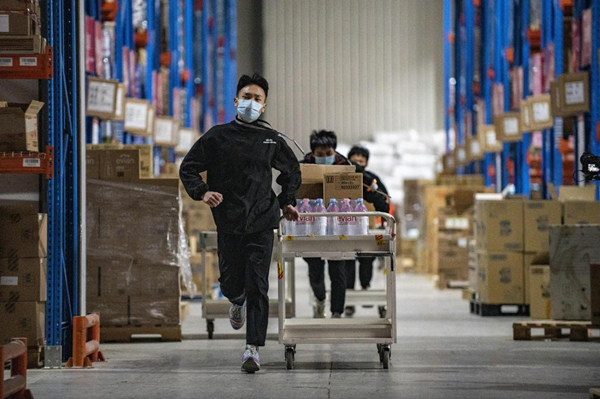China's express parcel volume expected to hit 108.5 bln in 2021
Revenue of China's courier industry is expected to hit 1.04 trillion yuan ($163.19 billion) last year, up 18 percent from a year ago, with the number of parcels delivered growing 30 percent to 108.5 billion.

A man runs to collect parcels in a warehouse owned by Chinese e-commerce giant JD.com in Jinyi Comprehensive Bonded Zone, Jinhua, east China's Zhejiang province, Dec. 12, 2021. (People's Daily Online/Hu Xiaofei)
The industry is also expected to have created 200,000 new jobs and driven online retail sales of nearly 11 trillion yuan.
In the past year, over 130 designated cargo planes flew across China to deliver express parcels, and there were more than 1,500 rail routes employed for express delivery missions. Besides, over 28,500 high-capacity cargo vehicles worked for the sector.
Large parcel distribution centers were transformed into intelligent ones in an accelerated manner, and almost all transfer hubs were equipped with automatic sorting systems.
In addition, terminal services of the courier industry have been constantly improved. A joint delivery mechanism participated by various express delivery companies has been established at village, township and county levels, and the number of smart lockers was on a steady rise. Besides, there were 161,000 public service stations across the country.
As of the end of 2021, express delivery parcels could directly arrive at over 80 percent of administrative villages across China, and almost all villages in east China's Suzhou and Zhejiang provinces, and in Shanghai municipality were connected to courier services.

Primary students and a courier in Changxing county, Huzhou, east China's Zhejiang province showcase a carton house they have made from used express parcel packages, Nov. 24, 2021. (People's Daily Online/Chen Haiwei)
New models of delivery services were emerging, extending courier services to more villages. Courier-postal services combination was newly opened to 155,000 administrative villages last year.
In 2021, the State Post Bureau (SPB) continued tapping into the potential of the rural market and has newly built 40 high-quality programs demonstrating courier services' facilitation for modern agriculture, making the total number 100.
These programs streamline the delivery of featured agricultural products, and each of them has helped handle over 10 million parcels over the past year. They benefit a large number of agricultural businesses, such as coarse cereals in Lvliang, north China’s Shanxi province, seafood in Rizhao, east China's Shandong province, Maojian tea in Xinyang, central China's Henan province, oranges in Huaihua, central China’s Hunan province and rice noodles in southwest China's Chongqing municipality.
Over the past year, a total of 37 billion express parcels were collected from and shipped to rural areas across China, facilitating rural-urban commodity exchanges totaling 1.85 trillion yuan.
Express delivery companies speeded up the construction of overseas warehouses. So far, 240 overseas warehouses have been established, covering nearly two million square meters.
The SPB launched special campaigns to advance green transition of the courier industry, making strenuous efforts to fix problems such as excessive heavy metals and other specific substances in parcel packages, excessive packaging, and plastic pollution.As a result, the stock of packages containing excessive heavy metals and other specific materials significantly decreased, and excessive packaging has been preliminarily controlled.
A total of 6.3 million recyclable express delivery boxes were put into use, and 80.5 percent of e-commerce parcels avoided being packaged for a second time. Besides, the country has newly established 36,000 stations to recycle waste express delivery packages, and employed over 60,000 new energy and clean energy vehicles for parcel collection and delivery.
The SPB offered "one-on-one" guidance for major courier companies the last year, requesting them to practically enhance the protection over couriers' legitimate interests and rights. Wuhan, Shenzhen, Xi'an and some other cities achieved positive progress in granting priority to primary-level courier stations when they insure their employees against work-related injuries, and Anhui province has fully implemented this policy at both provincial and municipal levels.
Thanks to a series of campaigns launched to offer a better environment for couriers, 5,068 public and affordable houses were rented to them. Besides, 30,000 care centers were built for deliverymen across China, and 393,000 couriers received free medical services.

 Lishui establishes intelligent biodiversity monitoring system
Lishui establishes intelligent biodiversity monitoring system New fungus species discovered in Qingyuan
New fungus species discovered in Qingyuan Lishui transforms weirs to aid fish migration
Lishui transforms weirs to aid fish migration